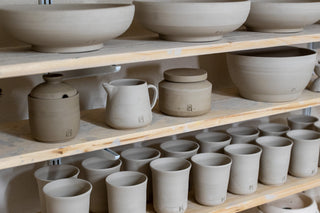Introduction
Definition of functional ceramics
The word "functional ceramics" describes ceramic objects that are intended for everyday use. This includes, for example, tableware such as cups, plates or teapots. In contrast to decorative ceramics, the focus here is on functionality. Utility ceramics must therefore be particularly robust and durable and meet certain requirements, such as heat resistance or dishwasher resistance, in order to withstand daily challenges.
Importance of stoneware for everyday ceramics
Stoneware is a great material for the production of everyday ceramics. Its unique properties make it ideal for making items that are subject to heavy daily use. Unlike decorative ceramics, functional ceramics focus on functionality and durability. Due to its high strength and density, as well as its low water absorption and excellent heat resistance, stoneware is the ideal choice for tableware. In addition, stoneware is food safe and dishwasher safe, making it a hygienic and easy-to-clean choice. Overall, the importance of stoneware for utility ceramics should not be underestimated, as it is a reliable and durable choice for everyday items.
What is stoneware?
Stoneware is originally a natural mixture of feldspar, quartz and clay, formed by the erosion of rock. Wind and rain slowly wear away the rock over millions of years. The heavy components remain in place, while the lighter ones are transported further by the water. Along the way, the clay is enriched with various "impurities," such as iron or manganese. This not only affects the color, but also the firing range, strength and how the clay behaves in the fire.
The clays available on the market today are mostly industrially mixed masses of different types of clay and raw materials. This ensures a consistent quality of the pottery.
Properties of Stoneware
Compared to other ceramic materials such as terra cotta or earthenware, stoneware is more durable due to its high density and strength. As a result, it is more resistant to scratches, wear and damage. Stoneware also absorbs so little water that it is considered waterproof. This means that cleaning in the Dishwasher is possible and easily done. Stoneware is therefore an ideal choice for items that are subject to heavy daily use, such as tableware or garden pots that are left outside in winter. Only porcelain has a higher density and strength than stoneware, but it is much more expensive.
Overall, the high durability of stoneware is another advantage that underscores its importance in functional ceramics.
Versatility of Stoneware
Stoneware offers a wide range of possibilities for the design of functional ceramics. The variety of colors, surface textures and shapes makes it possible to create individual and unique pieces that are both functional and aesthetically pleasing
Colors
Stoneware comes in a variety of colors. From natural earth tones to vibrant and bold colors. Some of these colors are created naturally and some are created by mixing in color bodies. A particularly popular color in stoneware is the classic reddish brown, which is created by the presence of iron oxide in the clay. But gray, black, red and blue are also common.
Texture
The surface of stoneware can be fascinating. A skilled ceramist can create incredible variety of textures simply by working the surface the right way. Smooth and technical or rustic and rough like a rock. Carved patterns, reliefs and colorful inlays are also common. At this point, it would be going too far to try to address all the textures of stoneware. It should at least be said that, in my opinion, no other ceramic material can match the variety of stoneware.
Form
The shapes of stoneware utility ceramics are almost infinite. Any imaginable shape can be designed with the right technique. Since the stability of unfired clay, can be regulated by the addition of leavening agents, such as grog, it is infinitely malleable.
Conclusion
Stoneware is known for its strength, durability, heat resistance and low water absorption, making it ideal for items such as tableware and decorative ceramics. Stoneware is also easy to clean, making it hygienic and perfect for everyday use. Due to its properties, stoneware is more resistant to scratches, wear and damage than other ceramic materials such as earthenware or terracotta. Stoneware comes in a wide variety of colors, textures and shapes, making it a versatile material for creating unique and aesthetically pleasing pieces.
If you need dinnerware or garden pottery that is extremely durable and extremely versatile. Easy to clean and can even be left outside in the winter, then stoneware is the perfect choice!

